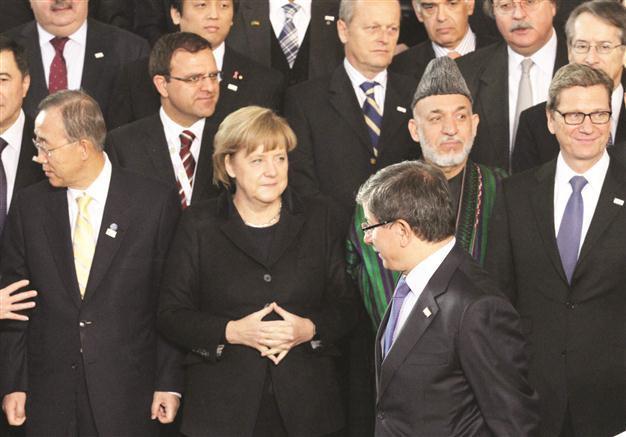West pledges continued support to Afghanistan
BONN, Germany

Turrkish Foreign Minister Ahmet Davutoğlu walks by as UN Secretary-General Ban Ki Moon, German Chancellor Angela Merkel, Afghanistan President Hamid Karzai and German FM Guido Westerwelle pose during the International Afghanistan Conference at the World Conference Center Bonn (WCCB) in Bonn. AA photo
U.S. Secretary of State Hillary Clinton yesterday announced the United States was ending a freeze on hundreds of millions of dollars in development funds for Afghanistan, amid financial reforms.“The United States is pleased to announce we will be joining other partners in resuming financial disbursements to the Afghan Reconstruction Trust Fund (ARTF),” Clinton told a conference on Afghanistan in Bonn, Germany.
U.S. officials said the United States took its cue from the International Monetary Fund’s approval last month of a new loan for Afghanistan, after a year of difficult talks stalled by the massive Kabul Bank scandal.
In a bid to save it from collapse, the troubled lender was split into a “good” and “bad” bank in April after former executives granted themselves loans worth a reported $900 million. The IMF move occurred after Afghanistan was deemed to have made progress in establishing financial sector regulations.
In her five minute speech, the chief U.S. diplomat said the Bonn blueprint for progress in Afghanistan, following the withdrawal of U.S. and NATO combat troops in 2014, is based on the principle of “mutual accountability.” She said the U.S. and its international partners must remain committed to training, advising and assisting Afghan forces as they increasingly assume control over security. “The United States is prepared to stand with the Afghan people for the long haul; to support their transition to sustainable stability and growth,” Clinton told delegates from 100 countries and international organizations.
The Bonn conference is focused on the transfer of security responsibilities from international forces to Afghan security forces during the next three years, long-term prospects for international aid and a possible political settlement with the Taliban to ensure the country’s viability beyond 2014. Clinton stressed that in return for continued support, the Afghans must live up to their commitments “on taking difficult decisions to embrace reform, lead in their own defense and strengthen an inclusive democracy rooted in the rule of law.”
About 100 countries and international organizations were represented among the 1,000 conference delegates, including some 60 foreign ministers. “Your continued solidarity, your commitment and support will be crucial so that we can consolidate our gains and continue to address the challenges that remain. We will need your steadfast support for at least another decade,” Afghan President Hamid Karzai said. Afghanistan is economically dependent on foreign aid and spending related to the huge military presence, currently totaling about 130,000 international troops.
Speaking at the conference, Turkish Foreign Minister Ahmet Davutoğlu said a secure Afghanistan would be of great importance for the region’s security. While remembering Turkey hosted the Istanbul Conference for Afghanistan last month, Davutoğlu said, “At the Istanbul Conference, regional countries gave a very strong message of commitment to a secure, stable and prosperous Afghanistan in a secure, stable and prosperous region.”
“The region not only gave a resounding message of commitment but also made it clear that it will own, lead and develop the efforts for enhanced cooperation by adopting the ‘Istanbul Process on Regional Security and Cooperation for a Secure and Stable Afghanistan.’ I am pleased that the international community also strongly supported the regionally owned and led Istanbul Process,” he said. “Turkey’s commitment to Afghanistan is for the long-term.”
The conference’s final declaration outlines a series of mutual commitments for the decade following withdrawal of troops, communicating the message that Afghanistan “will not be left alone,” a German diplomat said. The international community also pledges to support the process of reconciliation with the Taliban, “with its basic principles being no to violence, no to terrorism and respect for the Afghan constitution and human rights,” he said.
Pakistan is a central player in regional efforts to improve trade and strengthen its weak economies. But its boycott has cast a pall over the session, highlighting the nation’s influence in Afghanistan and its ability to be the spoiler.
Pakistan is seen as instrumental to ending the Taliban-led insurgency in Afghanistan due to its links with militant groups and its unwillingness, from the U.S. and NATO perspective, to drive insurgents from safe havens on its soil where they regroup and rearm. Pakistan canceled its participation to protest last month’s NATO air assault, carried out from Afghan territory killing 24 Pakistani soldiers.
The deaths fed the popular perspective in Pakistan that the U.S. and NATO, not the Taliban, are Pakistan’s principal enemies.
The U.S. had once hoped to use the Bonn gathering to announce news about the prospect for peace talks with the Taliban, making it a showcase for political reconciliation, but Afghan and U.S. outreach efforts have not born fruit and no prominent Taliban representatives attended the conference.
Compiled from AP, AFP and AA stories by the Daily News staff.
















